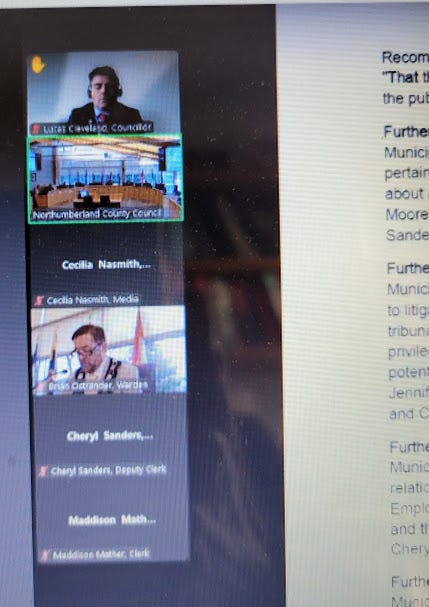Childish antics at council
Amalgamation dream dies as most municipalities say no thanks
I spent the past two weeks in B.C. hanging out with my 3-year-old grandson and figured I’d have withdrawal now that I’m back home, but then I watched Northumberland County’s council meeting online on Wednesday.
It had yelling, hand waving, strict orders to behave, pointed ignoring of bad behaviour, and threats to send someone out of the meeting. I felt like I never left B.C.
The source of the action will be no surprise to anyone who has paid any attention to county council’s sessions over the past two years. Cobourg Mayor Lucas Cleveland wasn’t at the meeting but wanted to attend via Zoom, which isn’t allowed under county bylaws. He didn’t take well to being told, No.
While councillors can attend committee meetings online, they are expected to be at full council meetings in person or send an alternate. For example, when Trent Hills Mayor Bob Crate couldn’t make a meeting a couple of months ago, Deputy Mayor Mike Metcalfe stepped in. Also, at the Wednesday meeting, Councillor Todd Attridge of Port Hope was filling in for absent Mayor Olena Hankivsky.
Cleveland is a regular thorn in the side of many councillors with his frequent interjections and insistence that his municipality is much more important than smaller, rural areas such as Trent Hills or Cramhe. He frequently complains that Cobourg residents pay far more to the county than they get in services.
So, perhaps it’s no surprise that near the start of the meeting when Warden Brian Ostrander noted that Cleveland wanted to join via Zoom no councillor would move the motion to override the rules and let him in. With no mover there was not even a vote. That left Cleveland watching but unable to comment or vote.
However, he did sit for minutes with his hand raised in an effort to get attention. His waving was obvious to the handful of us watching online. Occasionally, an arm would tire, and he’d shift hands, but Ostrander studiously ignored both physical hands and the coloured Zoom one that Cleveland finally opted to use.
Then, well into the meeting, Cleveland managed to get audio briefly a couple of times and tried to interrupt the session saying: “I want to raise a personal point of order, I want to raise a personal point of order.”
“You aren’t part of this meeting,” a frustrated Ostrander said.
After a third or fourth interruption, Ostrander told staff to cut Cleveland off if he tried to intervene again.
For the rest of the meeting, until it went into closed session without him, Cleveland’s Zoom hand was raised and ignored.
The irony is that the meeting actually dealt with one of Cleveland’s main issues, his suggestion that municipalities should be amalgamated and the county disbanded. At his instigation, council sent a request to the seven member-municipalities in January asking them whether they would support amalgamations, or a move to identify one or two areas where they might work together more efficiently.
But if Cleveland had been able to participate it’s doubtful he would have been happy. Only his town, Cobourg, and Alnwick/Haldimand voted in favour of considering amalgamation. No other municipality supported Cobourg’s (Cleveland’s) idea that the county disband, and the province send money straight to municipalities.
I wrote about Trent Hills’ quick rejection of amalgamation at a meeting in February.
Six of the seven municipalities, all but Cramhe, supported finding one or two services that the municipalities could work together on to increase efficiency. The proposal from staff was that consultants be hired, estimated at $150,000 per option, to look for ways to implement changes in services such as financial services or roads.
Cramhe Mayor Mandy Martin bristled at the suggestion that $150,000 be spent on the idea of sharing a financial services system since the chief administrative officers of all seven municipalities already agreed it was necessary.
“At the staff level we feel this is one we should work on collaboratively,” said Chief Administrative Officer Jennifer Moore.
“I don’t think $150,000 a pop here is exactly the way we want to go in terms of finding savings,” Martin responded.
The organizations need to trust and rely on the expertise they have, instead of turning to consultants constantly, she said. “This is what we have to do, we have to start solving within ourselves our issues and our problems. If we can’t figure it out, why on earth should we hand it off to somebody elsewhere to tell us how to do it?”
Finance Director Matthew Nitsch explained that the financial system being used by the municipalities had outlived its useful date and soon would no longer be supported. He said a decision on a replacement program and implementation would require outside help.
You can read all Trent Hills News stories on the website here.




